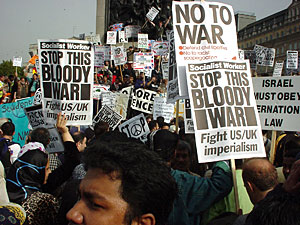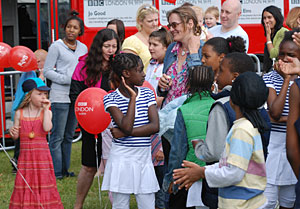PHOTO RIGHTS
 People, privacy & children People, privacy & children
Photographing Buildings
Tube and railway stations
Trespass/Obstruction etc
Deleting images
'Anti Terrorism' measures
Photographing the police (Sect. 76)
RESOURCES
Your rights on arrest
News, case studies & links
Photographing protests
Police statements on photography
Discuss this on our forum!
« Photo rights homepage
|
Photographers Rights - Street shooting, people, privacy & children
A brief guide for street photographers.
(©urban75, updated December 2009)
Some of the greatest photographs ever taken fall into the 'street shooter' category'.
Legendary photographers like Cartier Bresson and Andre Kertesz created their striking shots by walking the streets and looking for 'decisive moments,' interesting juxtapositions or just being in the right place at the right time.
 So it's vital for the art of photography that photographers should be able to go about their business without hassle from the cops - and by law that's exactly what they're entitled to do.
So it's vital for the art of photography that photographers should be able to go about their business without hassle from the cops - and by law that's exactly what they're entitled to do.
If you're on a public right of way - such as a public pavement, footpath or public highway - you're free to take photographs for personal and commercial use so long as you're not causing an obstruction to other users or falling foul of anti-Terrorism laws or even the Official Secrets Act (frankly, this one is unlikely).
DPP -v- Jones (1999): The Court recognised that the public may enjoy a public highway for any reasonable purpose, provided it does not amount to public or private nuisance or obstruct the highway "by unreasonably impeding the primary right of the public to pass and re-pass: within these qualifications there is a public right of peaceful assembly on the highway."
There's nothing stopping you taking pictures of people in public places within reason, but if you start shoving your zoom lens up their nostrils or taking action shots of their every step, there's a chance you might get a clip around the ear from your aggrieved subject or possibly face a legal charge of harassment or breach of the peace.
Harassment is defined as a 'course of conduct' (so it has to happen at least twice) that causes another person 'alarm or distress', but we have to say that the bullying and aggressive antics of the paparazzi would suggest that prosecutions are few and far between.
Photographers are free to use their photographs of people taken in public places as they wish - including for commercial gain.
Note: Professional photography is banned in London's Trafalgar Square and Parliament Square as well as the Royal Parks.
If you start breaking out the tripods, glampussy models, make up crew, Winnebagos and huge lights and reflectors, expect a parkie to turn up on the scene pronto demanding a hefty fee. However, be a little more low key with your shooting and you should have no problems.

People and Privacy
UK laws are fairly vague when it comes to defining what constitutes an invasion of privacy, but while street shots should cause no problem, you might get in hot water if you're strapping on colossal telephoto lens and zooming in on folks stripping off in their bathrooms - even if you are snapping from a public place.
The key seems to be whether the subject would have a reasonable expectation of privacy - a statement that seems vague enough to keep a team of lawyers gainfully employed for some time.

With some countries having stronger privacy laws, UK snappers looking to commercially exploit images of recognisable people snapped without their consent may find international clients unenthusiastic unless a model release has been obtained.
There's also a remote chance that photographs of people in public places may be subject to the Data Protection Act, but that's pretty unlikely if there's no other identifying information accompanying the image.
Photographing children
There are no laws against taking photos of children, but someone taking an unhealthy interest can rightly expect to attract unwelcome attention from the authorities (and quite probably passers by) pretty sharpish.
Be also mindful that if you're taking pictures in areas where dodgy folks, drug dealers and ne'er do wells may be in view, they're unlikely to be pleased with the attention and probably won't be bothered about the niceties of the law in their response.
If someone asks you to stop take pictures of them, it's generally a good idea to do so.
Update: According to  this blog, Home Office Minister Tony McNulty MP has commented on the current legal situation regarding privacy. this blog, Home Office Minister Tony McNulty MP has commented on the current legal situation regarding privacy.
"There is no legal restriction on photography in public places, and there is no presumption of privacy for individuals in a public place.
It is for the Chief Constable to ensure that Officers and Police Community Support Officers are acting appropriately with regards to photography in public places, and any queries regarding this should be addressed to the Chief Constable.
However decisions may be made locally to restrict photography, for example to protect children. Any questions on such local decisions should also be addressed to the force concerned."
Next: Photographing Buildings

Note: This article attempts to be a brief educational guide to the sometimes-complex matter of your rights as a photographer. It is not legal advice and we recommend seeking out proper legal advice if you encounter problems or contributing to our bulletin boards. Some material in this article has been sourced from the UK Photographers Rights website.
Photo rights homepage
|

 So it's vital for the art of photography that photographers should be able to go about their business without hassle from the cops - and by law that's exactly what they're entitled to do.
So it's vital for the art of photography that photographers should be able to go about their business without hassle from the cops - and by law that's exactly what they're entitled to do.